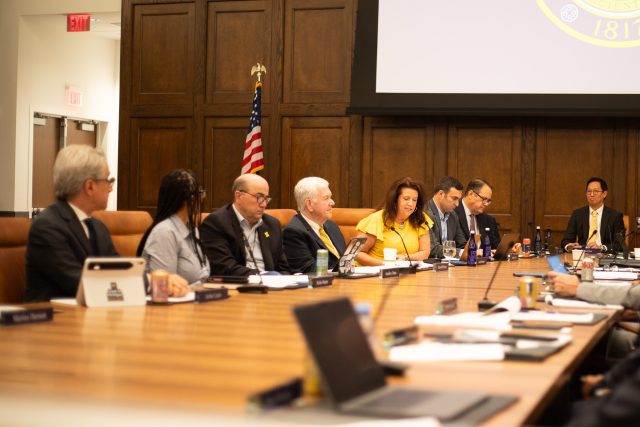[ad_1]
The University of Michigan Board of Regents met in the Alexander G. Ruthven Building Thursday afternoon to discuss their Year of Democracy and Civic Engagement strategic vision, a donation to breast cancer research and to hear public commentary regarding the University’s response to the ongoing Israeli military campaign in Gaza.
University President Santa Ono began the meeting with a moment of silence to honor the passing of University President Emeritus James Duderstadt and University Administrator Greg Harden. Following this, Ono announced University Regent Ron Weiser’s (R) $25 million donation to establish the Weiser Family Center for Breast Cancer, dedicated to advancing cancer research and care.
“(The donation is) a gift that will speed new discoveries, open new insights and further empower our world-class researchers to provide compassionate and personalized breast cancer care,” Ono said. “Ultimately, this gift will lead to treatment, healing and transformation of women’s lives.”
Public Policy professor Jenna Bednar, co-chair of the Year of Democracy and Civil and Global Engagement initiative, gave a presentation on the initiative’s goals and programming. She outlined plans to enhance student engagement with voting, introduce internships and offer new grant opportunities that aim to foster a long-term commitment to democracy.
“We did not want to have just a year of events,” Bednar said. “This is a university that creates and disseminates knowledge, so we wanted to take advantage of that and … be a force for triggering a lifelong engagement with being an agent in our democracy and also build up a sense of community on campus that values democracy.”
Following this, the board discussed the Committee on Diversity of Thought and Freedom of Expression, which was created in their January meeting. Timothy Lynch, vice president and general counsel, explained that a request to comment was put out to the community, and more than 4,000 people wrote back with diverse and thoughtful feedback.
“All of us should be proud of what our community had to say — thoughtful, opinionated, angry, great ideas,” Lynch said. “What (the committee) found was concerns about the University’s responses to protests. They found that there (were) significant constraints on free speech and diversity of thought.”
Regent Sarah Hubbard (R) emphasized the importance of facilitating free expression within the U-M community. The committee recommended that the University develop a course about freedom of expression for all incoming students and create a “formal Regents’ Bylaw” for institutional neutrality on political and social issues. This would be modeled after a more comprehensive version of the University of Chicago’s 1967 Kalven Report. Hubbard supported incorporating the Kalven Report, which recommended that the University remain neutral on important social and political issues. Hubbard asked Lynch to prepare a bylaw to be considered at the Board of Regents October meeting.
“I’m particularly intrigued with the idea of having a new required course for all new students … but I also believe the University should adopt a strong, comprehensive version of the Kalven Report,” Hubbard said. “I ask you, Vice President Lynch, (to) hear a draft Regent bylaw that would commit the University to institutional neutrality on political and social issues unless they have a direct impact on internal university operations.”
Ono then announced the appointment of Dr. David Miller as the next executive vice president of the University of Michigan’s medical affairs and chief executive officer of Michigan Medicine, effective July 1, 2025.
The meeting then moved to public commentary. LSA senior Alifa Chowdhury, Central Student Government president, called on the board to divest from companies profiting off the Israeli military campaign in Gaza.
“You quietly attempt to institutionalize your investment practices in hopes that doing so will allow you to escape scrutiny of students,” Chowdhury said. “You can’t escape us. Every day you prove to us that the University of Michigan is, above all else, a business.”
U-M alum Jackie Miller criticized the board, saying she believed they were not acting in the interest of students’ safety. In her comments, she referenced the use of police force on students at a board meeting earlier this year, the die-in protest at Festifall, a protest at the UMMA and the removal of the solidarity encampment on the Diag.
“The only violence we’ve seen this year has come from a few white supremacists on campus, and you,” Miller said. “When I say you, I include police and prosecutors acting at your behest. We know none of this was for student safety, because you’ve not acted at all when student protesters for Palestine have been threatened. Your actions have been selective and politicized.”
LSA senior Evan Cohen thanked the Board for their work in protecting Jewish students on campus and urged for further action in light of an antisemitic assault on a U-M student that took place earlier this week.
“Thank you for the work you are doing to support Jewish students on campus,” Cohen said. “Unfortunately, there is still work to do. … There’s a long history of people looking the other way when antisemitism rises. It’s critical to stand up for what’s right, to continue putting actions behind your words and to create an environment where students can learn without fear.”
Becky Woodell, a member of the Service Employees International Union, expressed a desire for active engagement from the Board on negotiating health care worker contracts, since members have not been able to reach a better pay and benefits deal for U-M health care workers.
“I’m here to ask you to show the same kind of leadership that was shown when you chose to be neutral when workers organized to form the unions,” Woodell said. “It requires visiting the budget to help fund our contracts. Our contracts must reflect respect for our contribution to the care of our patients. We have to see in real, tangible ways that collective bargaining gave us not just a seat at the table, but also materially improved our lives.”
Daily Staff Reporter Emma Spring can be reached at sprinemm@umich.edu.
Related articles
[ad_2]
Source link











